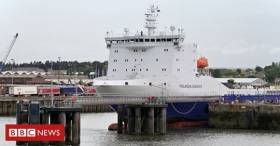Displaying items by tag: Brexit Timed
Brexit Time: Ferry Route Planned from Scotland to Netherlands
A shipping company based in Scotland is planning to start a daily ferry service linking Rosyth with the Netherlands.
Operations according to BBC News Scotland, would start around the time that Brexit is scheduled by the Westminster government.
That could make such a route a vital link for freight, if there are delays on crossings further south.
The ferry service would run between the Fife port and Groningen Seaport at Eemshaven, in the far north of the Netherlands near the German border.
News of the service first broke through Dutch news service RTV Noord, and was confirmed by David Kellas, director at TEC Offshore.
Offshore Activities
He explained the Perthshire-based company already has a wide portfolio of offshore activities.
These include drill ships, dive boats, floating oil and gas production vessels and floating accommodation for offshore workers.
He told BBC Scotland: "Eeemshaven is a more central port than people give it credit for".
However, it is not usually used for passenger services, and arrangements for that are still being discussed.
The operation would involve chartering two ships, each carrying up to 2,000 passengers.
Zeebrugge Service
There was a passenger ferry service between Rosyth and Zeebrugge in Belgium between 2002 and 2010. It became a freight-only operation until 2018 as Afloat previously reported.
For more click this link about the North Sea ferry development.
























































